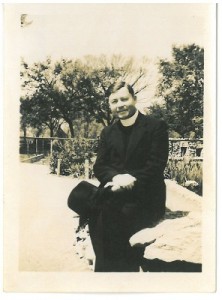Monsignor Leon McNeill documents, books give insight into institution’s first president
By Joyce Suellentrop
 Monsignor Leon A. McNeill was in many ways the logical – or perhaps, providential – choice as the first president of Sacred Heart Junior College, the forerunner of Sacred Heart College, Kansas Newman College and Newman University.
Monsignor Leon A. McNeill was in many ways the logical – or perhaps, providential – choice as the first president of Sacred Heart Junior College, the forerunner of Sacred Heart College, Kansas Newman College and Newman University.
McNeill, who served as president from 1933 to 1945, was an active cleric, a committed educator, an accomplished writer, and a crucial advocate for the college – as illustrated by the recent rediscovery at Newman of a large collection of his papers, books and personal correspondence.
From superintendent to president
McNeill was clearly a good choice to lead the new college. Ordained in 1927, he attended Catholic University for one year (1927-1928), probably sent by the Most Rev. Augustus Schwertner, bishop of the Wichita Diocese, to prepare him for developing the diocesan school system. McNeill was soon named superintendent of schools, a position he held until 1945, where he was responsible not only for the administration and supervision of parochial schools, but also for the Catholic training of the teaching sisters of the diocese.He was instrumental in establishing the Sisters College of the Diocese of Wichita as a branch of the Municipal University of Wichita, with classes held at the Cathedral of the Immaculate Conception. This arrangement, seen as a risky experiment by some and an endeavor worth watching by others, worked successfully from 1929 to 1933, enrolling sisters from seven religious orders.
In the spring of 1933, the Kansas State Board of Education required the sisters’ attendance on the university campus. As related by McNeill, this action prompted Mother Beata Netemeyer of the Adorers to ask him, “if they might start a college under the supervision and direction of the Diocesan School Office of which I was the head, and if I would consent to be the first president.”
As the United States was experiencing the Great Depression and the Dust Bowl at the time, McNeill recounted, “by human standards it was imprudent to open the college when we did, and only deep trust in the providence of God gave us the courage to go ahead.”
McNeill proved indispensable to the fledgling college, not only serving as president, but also teaching theology and philosophy, raising funds for operation and, perhaps most importantly, eliciting the support of the Catholic community, religious and lay.
The collection
Through the years, items and documents relating to the university have been saved, either by luck or design. In the early 1990s, Adorers who worked for the institution began a systematic collection. One of the major collections is the papers of Monsignor McNeill. Largely untouched until recently when the archives were given a space, the collection is currently being preserved, organized and filed. At some point, it will be available for research.
The collection currently fills three file cabinets. One significant file is the one containing items pertaining to the Sisters College, Sacred Heart Junior College, the hiring of faculty, and letters to donors. Another group of files, the Catholic Welfare Conference, Catholic Action, and Catholic Rural Life, chronicles his work for these national organizations from 1930 to 1945. In addition to the service McNeill performed as member and leader for those organizations, his work gave him access to many leaders in the Catholic community, which allowed him to build public awareness of and support for the young college.
Another group in the collection contains items of his publishing career. A prolific writer, he wrote textbooks, book reviews and articles for Catholic publications. Yet another file contains newspaper clippings, newsletters, reports, memos, lists and similar items. The files on his diocesan positions contain, not official papers, but casual papers relating to parish activities, travel, conferences, and social gatherings. Among the items in this group are photographs, souvenir booklets, and scrapbooks and Christmas greetings made for McNeill by grade school children of St. Mary’s Parish in Aleppo, Kan.The largest group in the collection is his personal correspondence from the 1920s to 1970. An inveterate letter writer, he wrote family, friends, colleagues, former students, fellow academicians, and even casual acquaintances.
As part of his funeral homily in 1980, the Most Rev. David M. Maloney, bishop of Wichita, noted that Monsignor McNeill served in almost every position in the diocese that a priest could: pastor; hospital chaplain; chancellor; Confraternity of Christian Doctrine director; director of the Venezuelan Mission and Papal Volunteers, and several more.
His collection gives depth to that portrait – a tireless worker ready for any challenge; a faithful priest; a scholar; a trusted colleague, and a loyal friend. In addition, the collection traces the national and local work of Catholic organizations and the development of the Wichita Diocese, particularly in religious education.
Tags: Leon A. McNeill, Newman, Sacred Heart Junior College, Wichita Diocese
